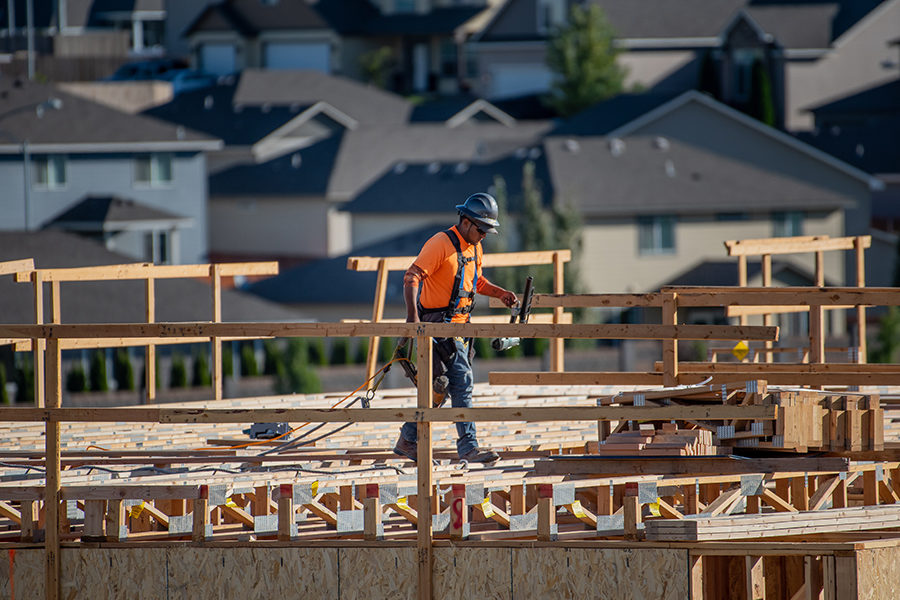
Home » Governor halts construction during coronavirus stay-home order
Governor halts construction during coronavirus stay-home order

April 13, 2020
Tri-City homebuilders and colleagues across the state are pleading with Gov. Jay Inslee to reclassify homebuilding an essential activity after the industry was sidelined by the Stay Home, Stay Healthy order to slow the spread of coronavirus.
“We respectfully disagree with your finding that home construction is not an essential activity, yet government funded construction projects are,” wrote Jeff Losey, president of the 600-member Home Builders Association of Tri-Cities, in a letter dated April 7.
While he’s not optimistic the governor will reverse course, Losey said the ongoing shutdown of nongovernment construction is a catastrophe for the building industry.
It will take 30 to 45 days at a minimum to restart stalled projects once the all-clear is given.
In the interim, construction sites are targets for thieves and vandals and are attractive nuisances to children. An open foundation and a sheet of plywood is all that’s needed to turn an unsecure site into an unauthorized bike ramp, he said.
“The thieves are not dumb. They know everybody has walked away,” he said.
The industry has struggled with the Stay Home, Stay Healthy order since it was first issued March 23.
Homebuilding appeared to be classified as essential. That would have allowed builders to keep working and was consistent with federal guidelines and the position of the state of Oregon, among others. Two days later, the governor’s office clarified it is nonessential and all construction except for public sector work halted at midnight March 25.
Losey said the same distancing practices that keep construction work safe in Oregon and at government-funded job sites applies to homebuilding.
“The governor has been completely unclear,” he said. “Everybody continues to scratch their head.”
The Stay Home order has been extended through May 4, although that date is also uncertain.
Public and private school is canceled for the rest of the 2019-20 year as part of the effort to “flatten the curve.”
It’s too early to predict how the COVID-19 crisis will affect construction, one of the region’s most robust industries,
As of April 11, Washington state reported 10,411 positive tests for COVID-19 and 508 deaths.
The Tri-Cities reported nearly 400 cases and 30 deaths as of April 13.
There’s no question it will be damaging, said Craig Colligan, manager of the Seattle office of Rider Levett Bucknall, a construction cost estimating firm.
Colligan praised the industry for stepping up to help and the governor for trying to protect the state from a deeper crisis.
That said, the cost and impact will be huge. Idle equipment costs money. Construction cranes rent for up to $30,000 a month even if they’re not used. Construction materials that can’t be delivered to job sites have to be rerouted to warehouses for storage, another cost.
Expecting a banner year
Tri-City homebuilders expected a busy year, building on the record-setting 1,655 single-family permits issued by local building agencies in 2019. A booming economy and robust employment kept demand high.
Building activity started on a strong note.
Through Feb. 29, local agencies approved $176 million in construction activity, $70 million more than the same period in 2019, according to HBA statistics.
Collectively, local cities and counties approved 246 single-family homes in the first two months of the year, compared to 162 in 2019, and 161 in 2018.
March figures were not available but it’s clear efforts to have coronavirus will disrupt the industry.
Just how long is unknown. However, homebuilding is driven by jobs, access to capital and of course, access to building materials, many of them sourced from China.
Everything is disrupted, Losey said.
Building departments
Prior to the stay-home order, homebuilders with active local projects were adapting to protective measures adopted by local cities and counties, which issue building permits and conduct inspections to ensure work is up to code.
Government offices are closed, but inspectors remained on the job, connecting with builders by phone and email.
Benton County adopted the most aggressive posture. It requires everyone to clear a building site before an inspector will visit. It has also halted inspections of all occupied buildings, meaning interior remodels, repairs and the like are not getting inspected.
Franklin County and the cities of Kennewick, Pasco, Richland and West Richland were booking visits by phone and email.
Continued demand depends on how long businesses stay closed and how quickly jobs are reestablished.
“We have to have people with jobs who still have them,” Losey said.
The Washington Employment Security Department reported a record 170,063 new unemployment claims the week of March 29-April 4, 2,627 percent more than a year ago and 41 percent more than the prior week. There were 26,075 unemployment claims during the worst week of the Great Recession.
The federal Labor Department reported the week ending April 4 that a record 6.6 million Americans applied for unemployment benefits.
Real Estate & Construction Local News
KEYWORDS april 2020





